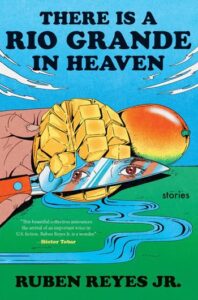Choose Your Own Adventure: On the Limits of Personal Agency in Migrant Fiction
Ruben Reyes Jr. Considers the Role of Systemic Power Structures Both On and Off the Page
The streets in Iowa City are too dark. You walk down Church Street, wishing there were more light posts. Kirsten says she’s been trying to write a Choose Your Own Adventure story. Growing up, you loved flipping through the pages of a book out of order, so the challenge is appealing.
During the bleakest months of the Trump presidency, you’ve been writing stories about Salvadoran children. It’s the only way to stay sane, and to combat the scapegoating of migrants who remind you of your own family members. Writing a CYOA story seems fun, but will it help you preserve the dignity of the people, and country, that shaped you?
If you write the story, scroll down and keep reading.
If you don’t, scroll to the top of the article.
*
“In the West, fiction is inseparable from the project of the individual,” Matthew Salesses writes in his excellent book, Craft in the Real World. And as the scholar Glenda Carpio argues, this focus on individualism—or the assumption that immigrant writers will “will offer personal, semi-autobiographical testimony of successful or traumatic acculturation”—occults the “larger historical, political, and economic conditions that produce migration.”
Creative writing pedagogy frames individualism as “character agency:” Characters should be forced to make decisions. Interpersonal conflict moves a story along. This advice, though, does not account for marginalized characters, whose agency is limited as soon as they enter a scene. A story about an incarcerated man cannot ignore the prison.
A migrant child poses a literary problem. A character without agency isn’t very compelling, but one with too much agency will read as unrealistic, especially if it obfuscates the social limitations set on them. This might sound like a useless conflation of politics and literature, but they’re one in the same. “Craft tells how to see the world,” Salesses writes.
The question becomes: how can we shift from our storytelling from the individual to the structural? In other words: How do you write a hero’s journey for someone who’s been seldom seen as a hero?
*
So much of the debate around immigration focuses on migrants’ personal agency, and not the systems that govern their lives. The Trumpian logic hinges on their “choices:” Parents chose to leave their homes despite the US’s warnings, so when their families are detained and separated, it’s their fault. Violence is not cruelly inflicted, but the deserved outcome.
To question these assumptions, I wrote a Choose Your Own Adventure story about a Salvadoran child who wakes up to find that one his parents has left for the United States.
The story is written in second person, partially because it’s standard for the genre, but also because it implicates a reader, forcing them to make the impossible choices Central American migrants face daily. (About the protagonist’s parents: “Who would you miss most, if you had to miss them again?”)
The protagonist is the migrant child, the reader, and the author simultaneously, a multiplicity that honors interconnected our lives—and its struggles—are. Immigration is not an individual burden migrants carry on their own. You and I, whether we know it or not, hold responsibility.
Then, I could play with false choices. Unknown to the reader, the story has cul-de-sacs. The story ends, or it loops to one of two points, only going where I allow it to. To push this metacommentary further, I wrote decisions that that strip the protagonist, and in turn readers, out of any real power. (For example: “The desert is your only choice. Turn to page 196.”).
Personal agency is only part of the equation. Even the most empathetic reader cannot guarantee the protagonist a happy ending.The end result: a story that lays bare the truth about immigration. Personal agency is only part of the equation. Even the most empathetic reader cannot guarantee the protagonist a happy ending. As much as they might want to, and as thoughtfully as they choose, too many paths lead to hunger, death, unhappiness.
*
I was tempted, in a headrush of authorial power, to fill my collection with happy endings—but that felt dishonest, especially as the news cycle filled with images of children separated from their parents, infants representing themselves in asylum court, children losing the little control they had over their lives. If I could force a reader to share even a drop of their frustration and pain, I had an obligation to.
This should be our goal: Make the world, and its systems, visible in our fiction, then populate it with three-dimensional characters. For me, this meant embracing my version of what Carpio calls “migrant aesthetics:” a set of formal strategies that “reject the empathy model of fictional relations, inviting readers to inhabit positions not persons.” Life is about power differentials—fiction should be too.
Central American migrants, are not villains, animals, or monsters, but they also aren’t pawns without any control over their circumstances. They’re fallible humans navigating the system they were born into. Even when the gears are greased with their sweat, they have a say in their fates. If the politicians and pundits won’t acknowledge this paradox, my fiction must.
*
A migrant child poses a literary problem. How you tell their story is the solution.
We write the world we want to see. The choice is ours.
__________________________________

There Is a Rio Grande in Heaven: Stories by Ruben Reyes Jr. is available from Mariner Books, an imprint of HarperCollins Publishers.




















